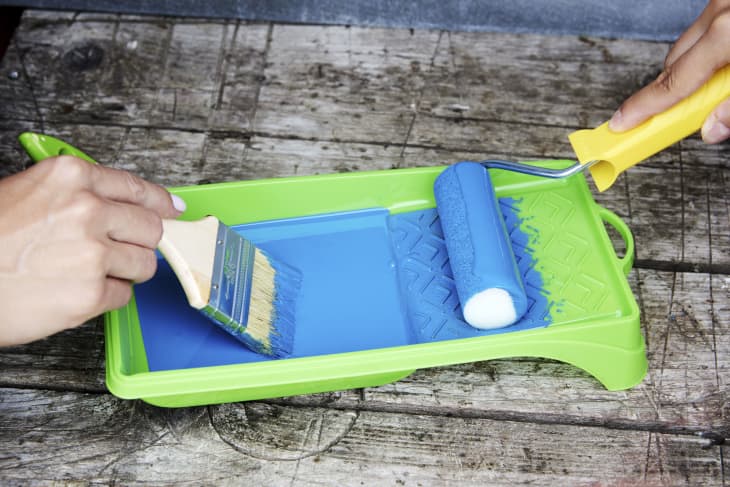The 2 Easiest Ways to Clean Your Paintbrushes and Rollers

When someone in my family moves or needs to redecorate, we tend to get together and have a painting party. That means we end up with a lot of used paintbrushes and rollers all at once. In an ideal world, we’d get them cleaned right away. But sometimes, they’re left to sit for a little bit — which can end up causing issues when we try to clean them. But now, we don’t have to worry about how to clean rollers and brushes, whether they’re still wet or dry. Anthony Kulikowski, owner of Five Star Painting of South Bend, a Neighborly company, shared his tips on how exactly to clean them.
How to Clean Paintbrushes and Rollers
For wet paintbrushes and rollers, start by removing excess paint, then scrub and massage it in soapy water. Rinse with warm water and repeat this process as needed. For paintbrushes and rollers with dried-on paint, start by submerging it in warm, soapy water. Slowly massage out the paint, then rinse and repeat as needed.
How to Clean Wet Paintbrushes and Rollers
If you want the best chance of getting your rollers and brushes clean, tackle them when they’re still wet with fresh paint. Here’s what to do.
Step 1: Get the excess paint off the roller or brush
You can roll it off a roller or squeeze it off a brush back into a paint tray. Then, use a paint scraper to scrape the paint back into the paint bucket.
Step 2: Fill a container with warm water and soap.
Fill a container, like a washtub or a bucket, with warm water and soap (or another solvent like ammonia or acetone, depending on the type of paint you’re using). Scrub the roller and massage the bristles on your brush in the soapy water until all the paint is out. Rinse with warm water. Repeat the process until the water runs clear.
How to Clean Dry Paintbrushes and Rollers
Unfortunately, just using soap might not work if you’ve got dried paint on rollers and brushes. Kulikowski says to use the manufacturer-suggested solvent for the paint you’ve used — you can likely find it on the company’s website. Find out what it is, then follow these steps.
Step 1: Submerge brushes in water.
Fully submerge your brushes and rollers in warm, soapy water with the solvent added.
Step 2: Massage to remove paint.
Slowly try to massage out the paint from the brush or roller.
Step 3: Rinse and repeat, if needed.
Rinse with warm water and repeat until all the paint is cleaned off.
Keep in mind that there are no guarantees you’ll be able to get all the dried paint off, and it could even damage your painting tool. Kulikowski says that for the amount of effort it takes, “it is recommended to buy a new one instead and properly clean it directly after use.”
How to Dry Paintbrushes and Rollers
No matter what, do not leave a clean but wet roller or brush on its side. That’ll result in an uneven texture on a roller or slanted bristles on a brush. Kulikowski recommends hanging them to dry, either from a dowel or some string. And remember to keep the drying area clean — any dust or dirt will settle into the painting surface and cause issues when you use it next.
What Not to Do
We know painting supplies can be expensive, but don’t let that encourage you to keep them forever. Kulikowski says keeping paintbrushes and rollers beyond their intended use can cause issues. For one, bristles on brushes can start to fall out with overuse. But for rollers, it can make painting itself even trickier.
“While it is nice to clean and reuse paint rollers, they are not meant to be kept forever,” Kulikowski says. “Using an old or dirty roller can lead to inconsistent paint texture and add lots of time to the painting process. After three or four uses, the roller cover should be replaced. However, the metal frame you can use indefinitely.”